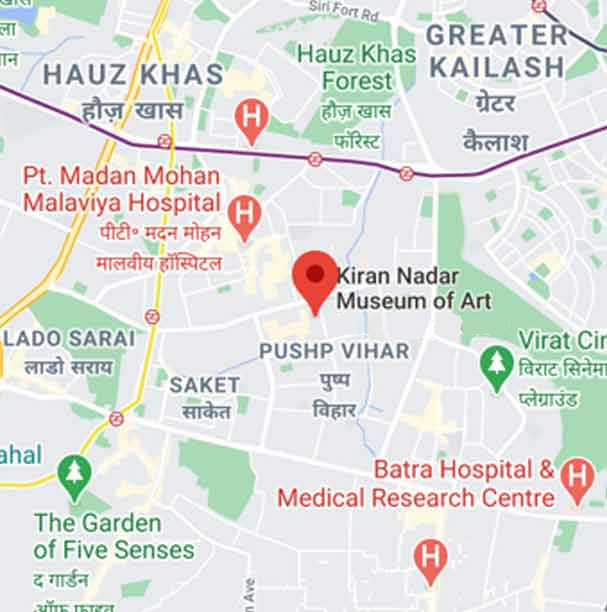- Home
- NGO
NGO
Stencil Art
Facilitated by Anpu Varkey
18 & 19 October 2021, 4:00 pm – 6:00 pm
Part of the Methods series
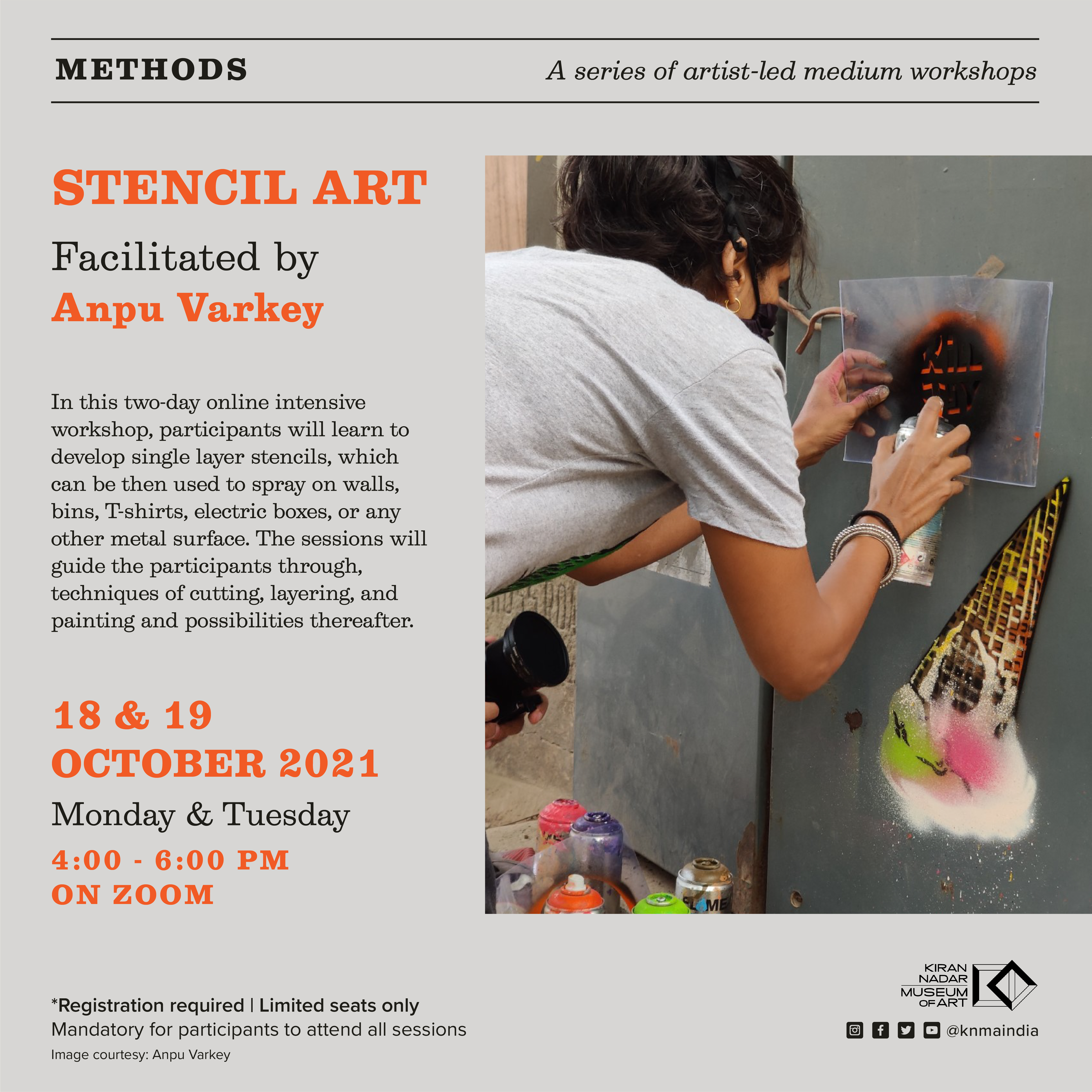
In this two-day online intensive workshop, participants will learn to develop single layer stencils, which can be then used to spray on walls, bins, T-shirts, electric boxes, or any other metal surface. The sessions will guide the participants through, techniques of cutting, layering, and painting and possibilities thereafter.
The workshop is open to all participants who are 18 years and above. Interested participants are expected to commit their presence on all days. The sessions will take place on Zoom.
Materials required:
A cutter/ exacto knife, (precision knife), a cutting mat (any hard surface that might not leave a scratch in table) acrylic paints, a small 2 inch roller or sponge, a palette or any surface to roll the paints, spray paints (optional), tape or gum, thick chart paper (A3 size 3 sheets), A3 size normal cartridge paper (5 sheets).
The participants will be provided with 2 images which will have to be printed out before the start of the workshop. Participants also need to arrange an A4 size black and white print out of their choice, any photograph of an object, animal, portrait, etc. Please make sure it’s slightly blown up and has a high contrast, the central image should be big enough to cut.
Addicted to heights, time travel and insipid barren landscapes, Anpu Varkey since 2011 has worked on monumental public art murals across the country and abroad, and has co organized several street art festivals in India. In 2014, she self-published her first graphic book ‘Jaba’, which takes a look at a day in the life of her companion cat.Summer’s Children’, her second book, the first edition was also self-published in 2019, followed by an eponymous exhibition of Anpu Varkey’s original drawings and animations at the Kiran Nadar Museum of Art, New Delhi, under the young artist of our times series, devised by Akansha Rastogi. She has a penchant for climbing trees and hanging on ladders.
Methods : A series of artist led medium workshops organised by KNMA
The force driving at the crux of the segment has been to re-examine the mandate of a medium centric ‘workshop’ and looks beyond the usual format of craft-hobby workroom sessions. At the heart of each session is a chosen artist with their unique style of expression and fashioned in an actively interactive module of facilitator-participant format. This KNMA series highlights how the paradigmatic shifts in contemporary art making need to be registered at individual levels and not merely as institutional applied skill dissemination. The workshop opens up room for both artists and non-artists as well as keen learners to interact with practitioners from a wide spectrum of styles and media to reimagine the tools and raw material for art making - ranging from drawings, maps, personal memories to printing techniques to textual excerpts to found or broken objects, just to name a few.
Module curators: Neha Tickoo and Madhurima Chaudhuri
Drawing ka Darrr
Exploring Drawing Exercises in a Sketchbook
Facilitated by Gagan Singh
29 & 30 September 2021, 4:00 pm – 6:00 pm
Part of the Methods series
Registration for the workshop has been closed because we have reached the maximum number of registrations for the event.
Thank you for your interest!
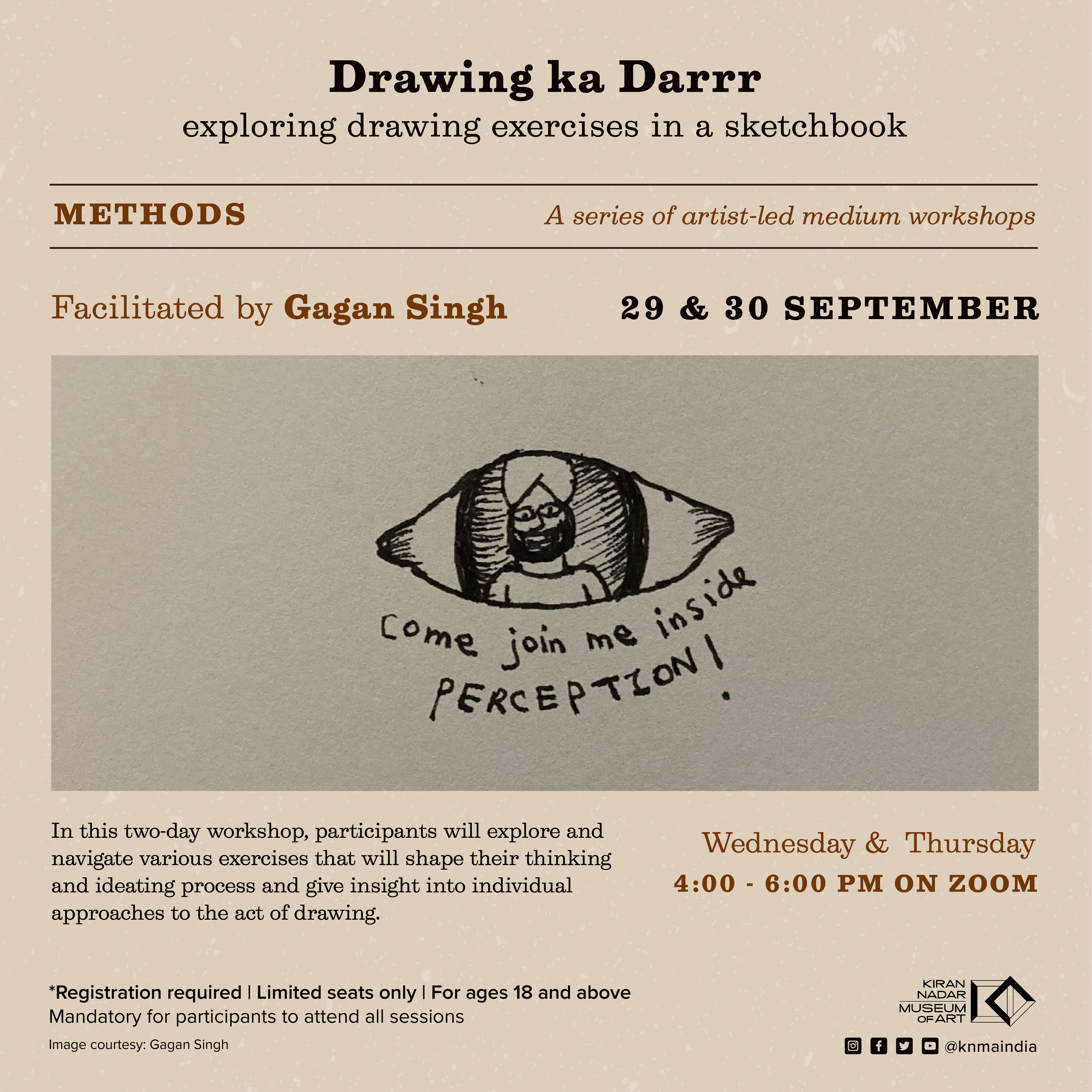
The workshop will explore how we race through different sub-stages of cognitive processes and how that shapes our thinking & ideating processes and gives us an insight into what drawing exercises are for us. The two-day workshop is conversational in structure, instructive in nature and has the aspect of a narration and storytelling embedded. This program is part of Methods, an ongoing series of artist-led medium workshops.
The workshop is open to all participants who are 18 years and above. Interested participants are expected to commit their presence on all days. The sessions will take place on Zoom.
Materials required:
Paper, glue, pencil, pen, marker, charcoal stick. Participants can also use a new or an existing sketchbook. They are free to create their own sketchbook before the start of the workshop by putting together loose sheets of paper or even plastic sheets. Others materials that can be used as a surface for drawing includes glass, plastic sheets, metal and digital devices such as an i-PAD with an apple pencil
Gagan Singh primarily defines himself as a Delhi-based object, and a visual artist dabbling in drawing - different modes of narration including illustrations, installations, storytelling, wall art and artist books. He is influenced by perception and explores various themes including everyday life, relationships, human nature through a satirical lens with the element of humour acting as an access point.
Born in 1975, Singh graduated from the Kent Institute of Art & Design, UK in 2005 with a Masters in Drawing. He has showcased his works in various solo and group exhibitions across the world including What I did Everyday (2019), Line Bombs (2014) in Mumbai; Mati Ghar (2014) in New Delhi; and The Drawing Project (2013) in Florida among others.
Methods : A series of artist led medium workshops organised by KNMA
The force driving at the crux of the segment has been to re-examine the mandate of a medium centric ‘workshop’ and looks beyond the usual format of craft-hobby workroom sessions. At the heart of each session is a chosen artist with their unique style of expression and fashioned in an actively interactive module of facilitator-participant format. This KNMA series highlights how the paradigmatic shifts in contemporary art making need to be registered at individual levels and not merely as institutional applied skill dissemination. The workshop opens up room for both artists and non-artists as well as keen learners to interact with practitioners from a wide spectrum of styles and media to reimagine the tools and raw material for art making - ranging from drawings, maps, personal memories to printing techniques to textual excerpts to found or broken objects, just to name a few.
Module curators: Neha Tickoo and Madhurima Chaudhuri
Day and Night
A Workshop in Shadow Play
Facilitated by Tarini Sethi
24 - 25 September 2021, 4.00 to 6.00 pm
Part of the Methods Series
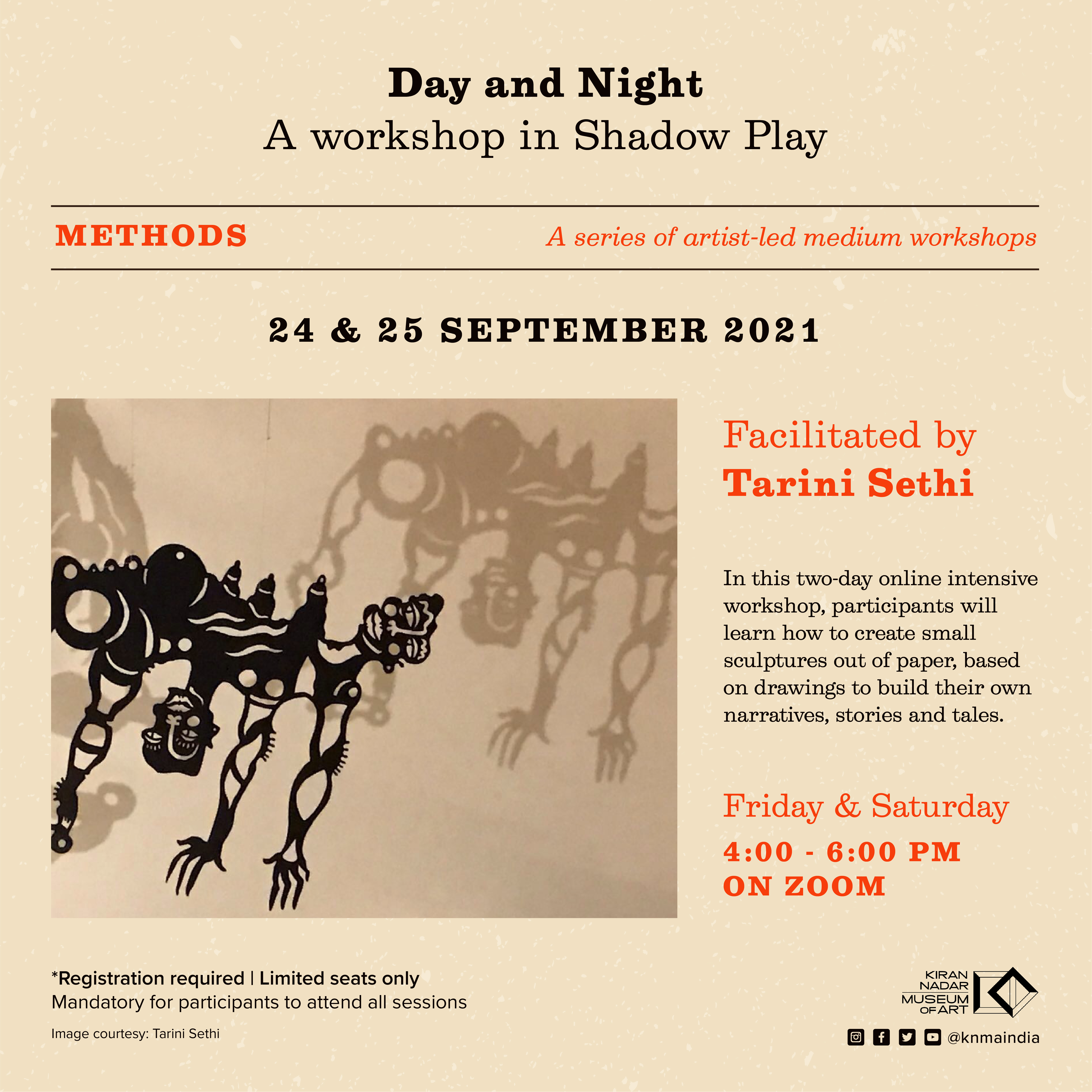
In this two-day online intensive workshop, participants will learn how to create small sculptures out of paper. These will be made based on drawings the participants will create from their own narratives, stories and tales. They will then cut into paper, and learn how to project these imagined figures onto different surfaces using two simple things - shadow and light. Bringing in architecture, nature and figures all into one, the focus will be on creating a simple experiential installation. This program is part of Methods, an ongoing series of artist-led medium workshops.
The workshop is open to all participants who are 18 years and above. Interested participants are expected to commit their presence on all days. The sessions will take place on Zoom.
Materials required:
Watercolour paper (200gsm or thicker), tape, exacto knife, pencil, eraser, ruler, wooden craft sticks/ thread and torch or phone light
Tarini Sethi studied fine art at Pratt institute and has participated in several shows around the world. In parallel, she has also been curating exhibitions for the last six to give a platform to independent artists to showcase their work. She is the founder and curator of the Irregulars Art Fair; India's first anti art fair and The Irregular Times, Indians first art and design newspaper. Sethi's work constantly revolves around the idea of “Utopias” or alternative worlds. She draws inspiration from folk tales, architecture of cities and stories of kings and queens alongside twists and turns of modern day politics. Her work unveils identity while exploring sexuality within personal spaces, both architectural and cerebral.
Methods : A series of artist led medium workshops organised by KNMA
The force driving at the crux of the segment has been to re-examine the mandate of a medium centric ‘workshop’ and looks beyond the usual format of craft-hobby workroom sessions. At the heart of each session is a chosen artist with their unique style of expression and fashioned in an actively interactive module of facilitator-participant format. This KNMA series highlights how the paradigmatic shifts in contemporary art making need to be registered at individual levels and not merely as institutional applied skill dissemination. The workshop opens up room for both artists and non-artists as well as keen learners to interact with practitioners from a wide spectrum of styles and media to reimagine the tools and raw material for art making - ranging from drawings, maps, personal memories to printing techniques to textual excerpts to found or broken objects, just to name a few.
Module curators: Neha Tickoo and Madhurima Chaudhuri
Small Forces
An online three-day intensive on Cities
With Rupali Gupte and Prasad Shetty
02 – 04 September 2021
THE ARTISTS’ WAY #6
A Series of Intensives
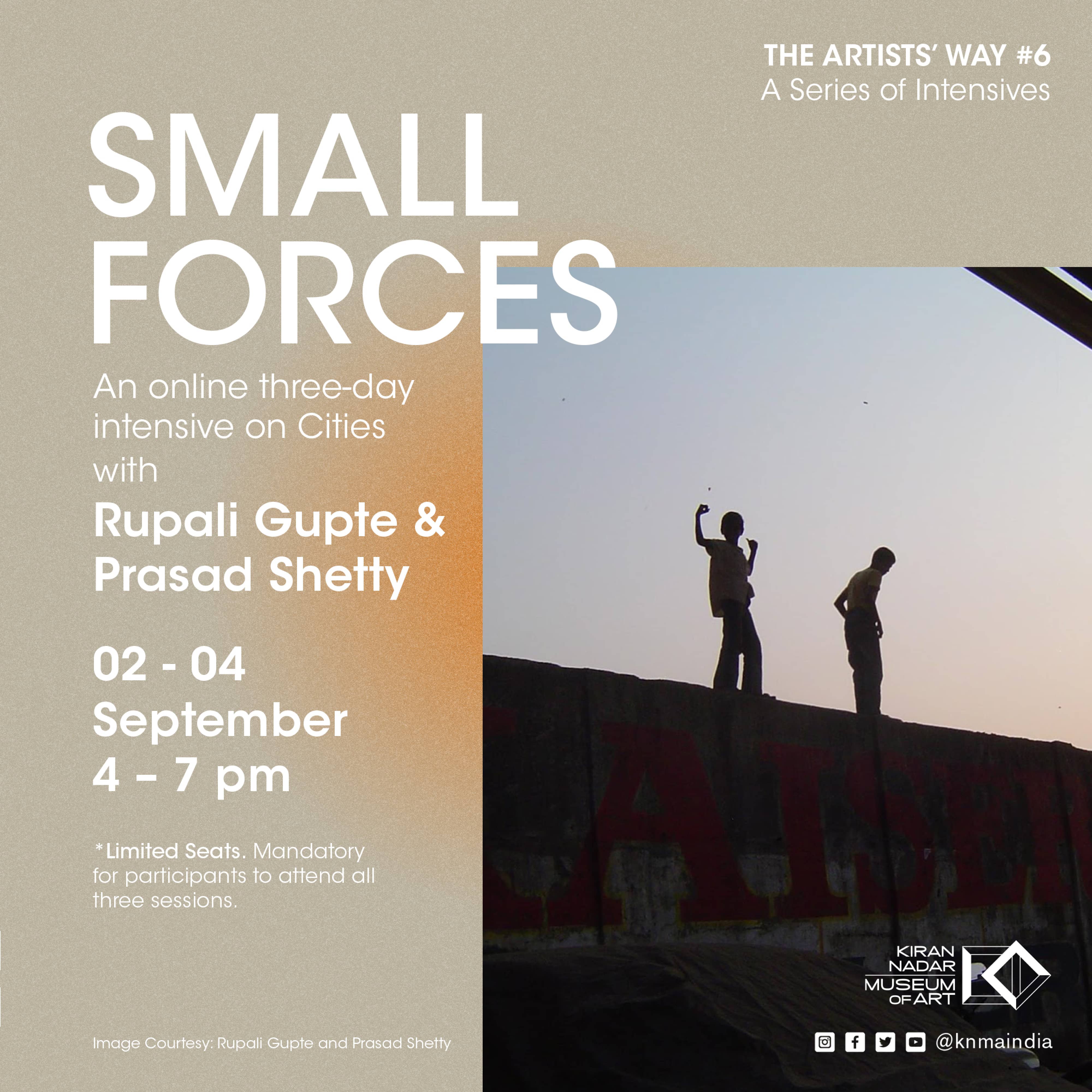
This three-day intensive is based on Rupali Gupte and Prasad Shetty’s hypothesis on ‘small forces’ which has emerged largely from their field work experiences. It will discuss cities as composites of small forces of energetic selves. Energetic self here is the dimension of the self that drives one to undertake specific activities connected to one’s desires. These could include - collecting strange objects, behaving like spies, writing stories, achieving mundane targets, opposing new ideas, making antennae to listen to strange sound waves, counting every tree, tracking obscure data, etc. Energetic selves also express themselves in everyday friendships and compassions.
These practices go beyond the acts of routine and are considered unproductive in generating grand conceptualizations of cities. They are often discarded as stray individual preoccupations, anecdotes or subjective obsessions. While some of these are related to earning and occupations, others are simply ‘useless’. Everyone seems to have a trip that one lives with and for. Trips seem to provide individuals with their energy. Such energies, expressed in absurd quests, unusual obsessions and bizarre interests cumulatively appear to be producing the city. The city seems to acquire its generative energy from such small forces. In many ways the city seems to be a mad house and madness seems to be running it. Urban theory and pedagogy has seldom engaged with an understanding of these small forces or extended it for speculative / projective purposes.
The three days of the intensive aim at exploring frameworks for engaging with the idea of ‘small forces’ through narratives, stories, semi-fiction, transactional capacities of form within urban environments, etc. The focus will be to think of cities (and societies) through non-institutionalised frameworks, not as a set of infrastructure or a meta-society, but as trips & kicks. Sessions are conceptualized as a conversation catalysed through provocations, to open up the mechanics of our orientations with cities. Participants are expected to be active conversationalists and co-thinkers to collectively explore this terrain. The conceptual coordinates for this workshop will be the works of Walter Benjamin, Charles Baudelaire, Peter Linebaug, Marcus Redikar, James Gibson, Abdoumaliq Simone and Solomon Benjamin.
Participants will have access to the research material, resources and reading list prior to the sessions. This online intensive is free. Interested participants are expected to commit their presence on all days and participate in group discussions with their own examples and understanding. The age limit for participation is 18 years and above. The intensive may explore the possibility of further collaborative work towards the end.
Rupali Gupte & Prasad Shetty are urbanists based in Mumbai. They are co-founders of the School of environment and Architecture (sea.edu.in) and are partners at the BARD Studio (bardstudio.in). They are based in Mumbai, India.
This is the sixth program of the ‘The Artists’ Way’ series of intensives, organized virtually by KNMA. These intensives have been conceptualized and led by practicing artists who have been using workshops and different pedagogic formats as part of their art-making process, often collaborating with different groups and forming their own personal, formal and informal networks of learning and unlearning. The program is part of KNMA Education Outreach, with the focus on artistic research as new pedagogies of the future. Each intensive is unique, different in format, scope and methodology, wherein artists also share their related research. ‘The Artists’ Way’ program is outlined by Akansha Rastogi, with Madhurima Chaudhuri, Neha Tickoo and Priya Chandra.
Public Sculpture
3-day sculpture making workshop with found objects
Facilitated by Kausik Mukhopadhyay
26 – 28 August 2021
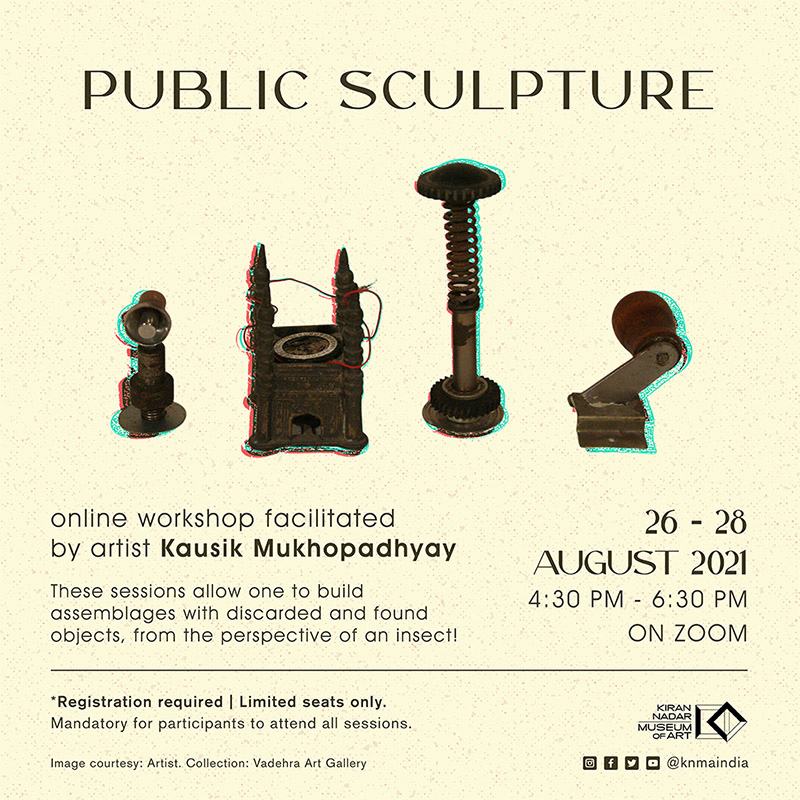
The inception of this workshop comes from memories of long walks on city roads or lanes and encountering discarded objects from our surroundings, sometimes palm sized only which tend to upswing our interest, even though fleetingly. Artist Kausik Mukhopadhyay twists and displaces this curiosity through the perspective of an ant, or a random insect that may find the fallen object as a large public sculpture.
In this workshop, from Day 1 to 3, participants will be introduced to the idea of making their own miniaturized installations and sculptures from found objects, and look at mundane things from a fresh perspective. They will go on to collect discarded objects around of their choice and make small sculptures for any insect of their liking. Eventually, the final work will be installed at places their tiny insects frequent, for them to admire.
The workshop is open to all participants who are 18 years and above. Interested participants are expected to commit their presence on all days. The sessions will take place on Zoom.
Materials required:
Participants who commit to attend the workshop need to collect one or few discarded objects, some glue, (Fevikwik will be good), cutters, hack saw blades, pliers, strings, and wire.
Kausik Mukhopadhyay (b.1960) repurposes old electronic objects into kinetic and static installations. His body of work revolves around experimental art and often touches Dadaism, Constructivism and Surrealism thematically. Mukhopadhyay has completed his education from Rabindra Bharati University and has also received a postgraduate degree in Graphics (printmaking) from Viswa Bharati, Santiniketan in 1989. He was awarded the fellowship at Kanoria Centre for Art, CEPT, Ahmedabad and the Inlaks Foundation. He is currently a faculty member at the Kamla Raheja Vidyanidhi Institute for Architecture and Environment Studies. Mukhopadhyay has showcased his works in both India and abroad in various solo and group shows including ‘Squeeze Lime in your Eye,’ Chatterjee and Lal, 2019; ‘Delirium // Equilibrium, KNMA, 2018; Shanghai Biennale, 2012 among others. Mukhopadhyay lives and works in Mumbai.
Common Resources
Drafting Fables for the Future
An online intensive workshop with Vibha Galhotra
13 – 16 April 2021, 4 – 7 pm
THE ARTISTS’ WAY # 5
Registration for the workshop has been closed because we have reached the maximum number of registrations for the event. Thank you for your interest!
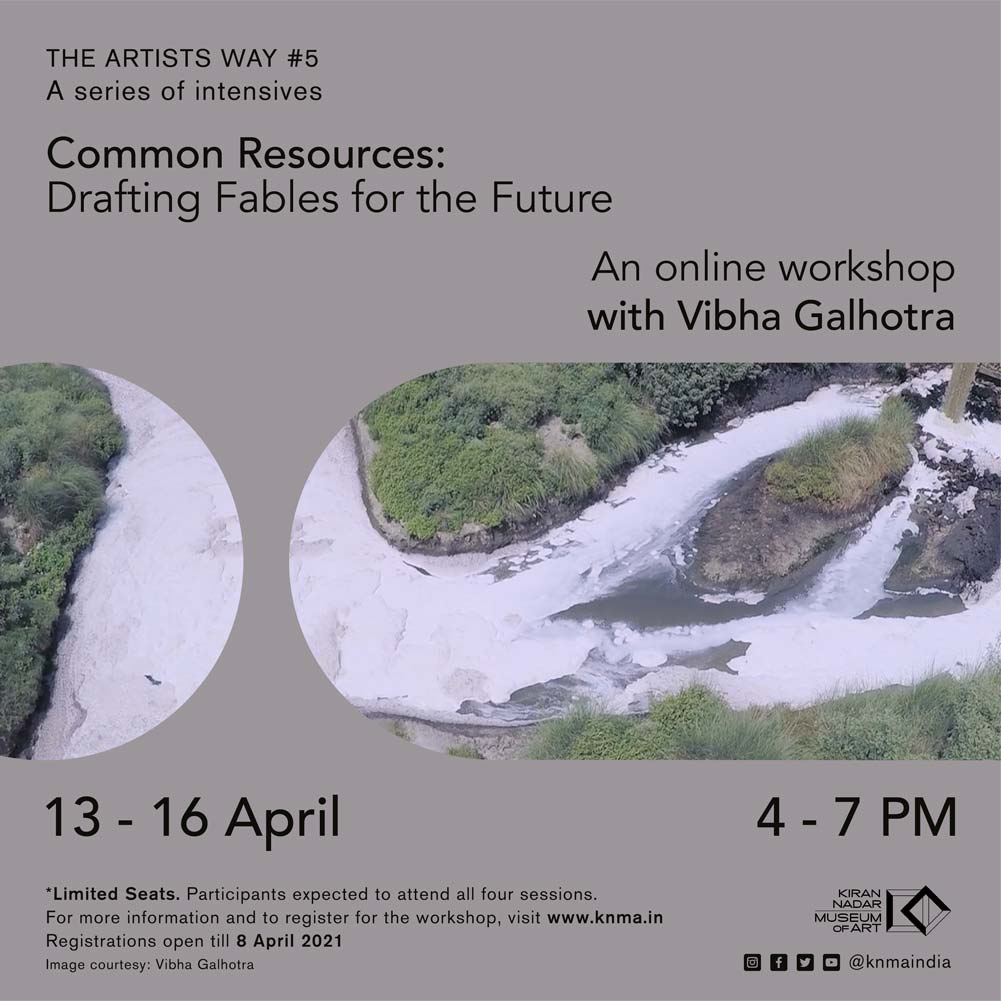
This four-day online intensive, focuses on aspects of care and ownership of common resources, in particular water and other shared natural resources. From ongoing inquiries in her artistic practice, artist Vibha Galhotra poses the following questions to be collectively addressed in the intensive: what do we know about our impact on global and local ecosystems? What steps and methods can we undertake to increase our awareness of and intervention into the subject? Can art instill a sense of caution and care in our collective fight for environmental equality and justice? The intensive is open to anyone interested in engaging and working with these questions and revisiting human's relationship to the natural world.
During the course of the workshop, environmentalists and experts on environment justice and urban ecosystems will interact with the group of participants, to think through the importance of care in relation to common resources. With specific case studies, sessions will explore how day-to-day elements of our sustainable ecosystems are affected, damaged and erased from our memory. The workshop will indulge participants to find their belonging with nature and weave their tacit and forgotten knowledge into a collective artwork.
Vibha Galhotra will share how her methods and engagement as an artist working around the questions of the environment and how over the years that has translated across different materials and concepts. We will move from a collective dining experience to discussing implicit relationship between the quality of water and food production, water heritage, lost ecologies, urban utopias, and towards drafting fables for the futures we want to imagine. The workshop is activity and discussion-based. The workshop will involve cooking as well as few exercises with easily accessible household materials such as threads, buttons, beads, sand, needle, glue, piece of cloth, handkerchief etc. Interested participants are expected to commit their presence on all days and undertake some group work between the sessions. The age limit for participation is 18 years and above. Towards the end, workshop will explore the possibility of further collaborative work.
Vibha Galhotra is a New Delhi-based conceptual artist, working in a variety of media, including sculpture, photography, printmaking, video, drawing, and text. Her work is influenced by nature, climate change, and the anthropogenic issues of our age. Her large-scale sculptural works address the shifting topography of the world under the impact of globalization. She has shown extensively in India, New York as well as internationally, with many projects that involve diverse communities and their regions.
Galhotra currently is a fellow of the Jerusalem International Fellow Program, 2020. She was awarded the Asia Arts Future Award, 2019, the Asian Cultural Council Fellow, 2017, and the prestigious Rockefeller Grant, 2016. Galhotra was born in the North of India, where she spent her formative years doing her Bachelors in Fine Art at Government College of Arts, Chandigarh followed by Masters of Fine Arts at Kala Bhavana, Visva Bharati University, Santiniketan, India.
This is the fifth program of the ‘The Artists’ Way’ series of experimental online intensives organized by KNMA. These intensive are led by practicing artists who have been using workshops as part of their art making process, often collaborating with different groups and forming their own personal, formal and informal networks of learning and unlearning. The series is imagined as an exploratory platform, with part pedagogic intent and infused with new questions, doubts, playfulness and also involving a collective/collaborative production towards the end of the workshop. The program is part of KNMA Education Outreach, with the focus on artistic research as new pedagogies of the future. Each workshop is unique, different in format, scope and methodology, wherein artists also share their related research. ‘The Artists’ Way’ program is outlined by Akansha Rastogi, with Madhurima Chaudhuri, Priya Chandra and Neha Tickoo.
Pushing Hands
Towards an Ethics of Curatorial Practice
Workshop led by Hammad Nasar
07 April 2021
This online workshop proposes the Tai Chi based exercise of ‘pushing hands’ as a model of practice that moves with incoming force to redirect it or allow it to exhaust itself. It will be a collective exercise for up to 10 practitioners in shaping projects in development through the lenses of: risk, authorship and tactics for togetherness.
Registration for the workshop has been closed because we have reached the maximum number of registrations for the event. Thank you for your interest!
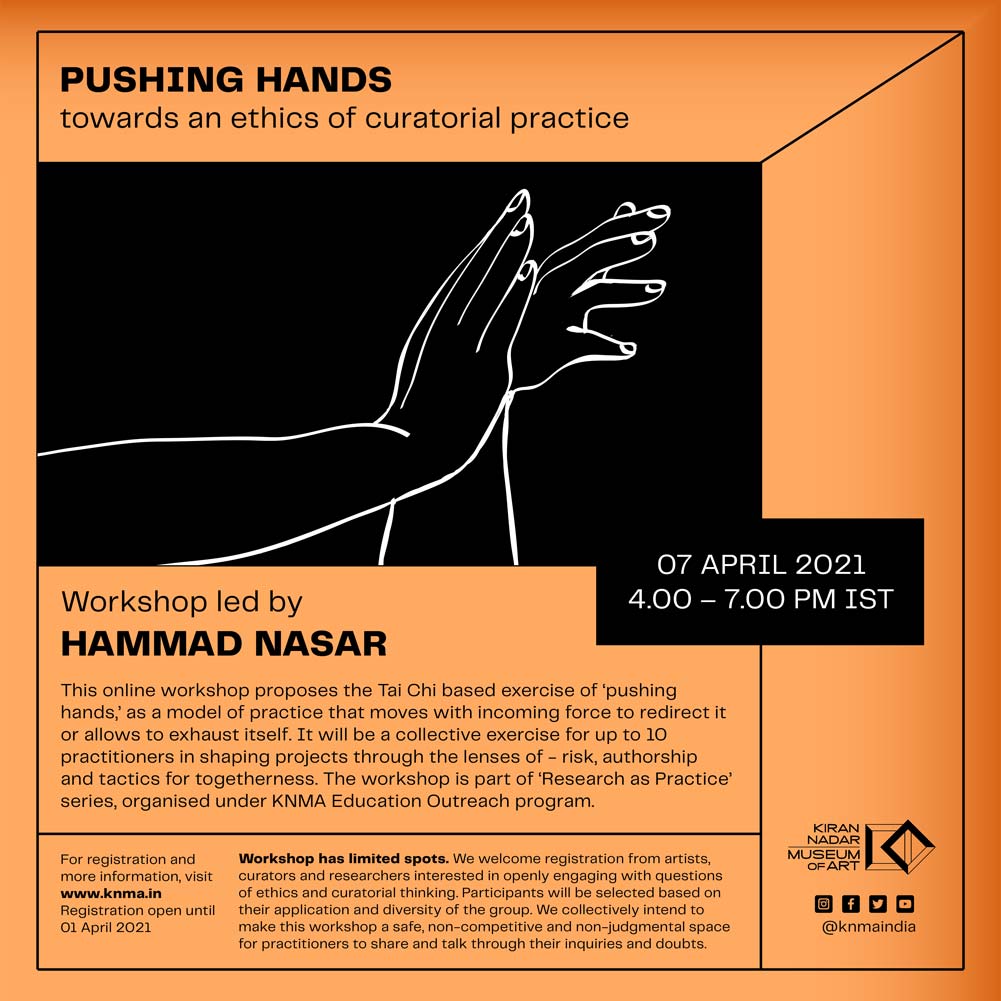
This online workshop proposes the Tai Chi based exercise of ‘pushing hands’ as a model of practice that moves with incoming force to redirect it or allow it to exhaust itself. It will be a collective exercise for up to 10 practitioners in shaping projects in development through the lenses of: risk, authorship and tactics for togetherness.
The workshop approaches the curatorial as an open field of inquiry into a wide range of contemporary conditions, stances, materials, spatial, organizational, personal and group dynamics. It invites participants to articulate difficult questions and urgencies emerging from their own curatorial and artistic research. It is conceived as a peer-exchange and discussion based three-hour long session with the aim of prompting processes of rethinking the frameworks and negotiations involved in staging difficult conversations via the curatorial as both site and method.
The workshop has limited spots. We welcome registration from artists, curators and researchers who are interested in openly engaging with questions of ethics and curatorial thinking. Participants will be selected based on their application and diversity of the group. We collectively intend to make this workshop a safe, non-competitive and non-judgmental space for practitioners to share and talk through ongoing inquiries and collectively through questions and doubts. The workshop will be recorded but not made available publicly. However, a limited-time view-only link will be shared with the participants.
Hammad Nasar is a London-based curator, researcher and strategic advisor. He is currently Senior Research Fellow at the Paul Mellon Centre for Studies in British Art, where he co-leads the ‘London, Asia’ project; Principal Research Fellow at the Decolonising Arts Institute, UAL where is developing the ‘Curating Nation’ project; and co-curator of British Art Show 9. He was the inaugural Executive Director of the Stuart Hall Foundation, London (2018-19); Head of Research & Programmes at Asia Art Archive, Hong Kong (2012-16); and, co-founded the pioneering hybrid arts organisation, Green Cardamom, London (2004-12). Known for collaborative, research-driven and exhibition-led inquiry, he has curated numerous exhibitions internationally. Nasar has served in advisory, trustee and board roles for numerous organisations including: Mophradat (Belgium), British Council, Delfina Foundation, Iniva, Manchester Art Gallery, Tate Etc. and Whitechapel Gallery (UK), Lahore Biennale Foundation (Pakistan) and Alserkal Avenue (UAE). He is a member of the expert panel for Art and Design, History, Practice and Theory as part of the UK’s Research Excellence Framework (REF 2021).
The ‘Pushing Hands’ workshop is part of ‘Research as Practice’ lecture series, organised under KNMA Education Outreach program.
Registration open until 1 April 2021
I Contain Multitudes
A workshop on portraiture and creations
Facilitated by Anish Cherian
25 & 26 February 2021, 4:00 – 6:00 pm
Registration for the workshop has been closed because we have reached the maximum number of registrations for the event. Thank you for your interest!
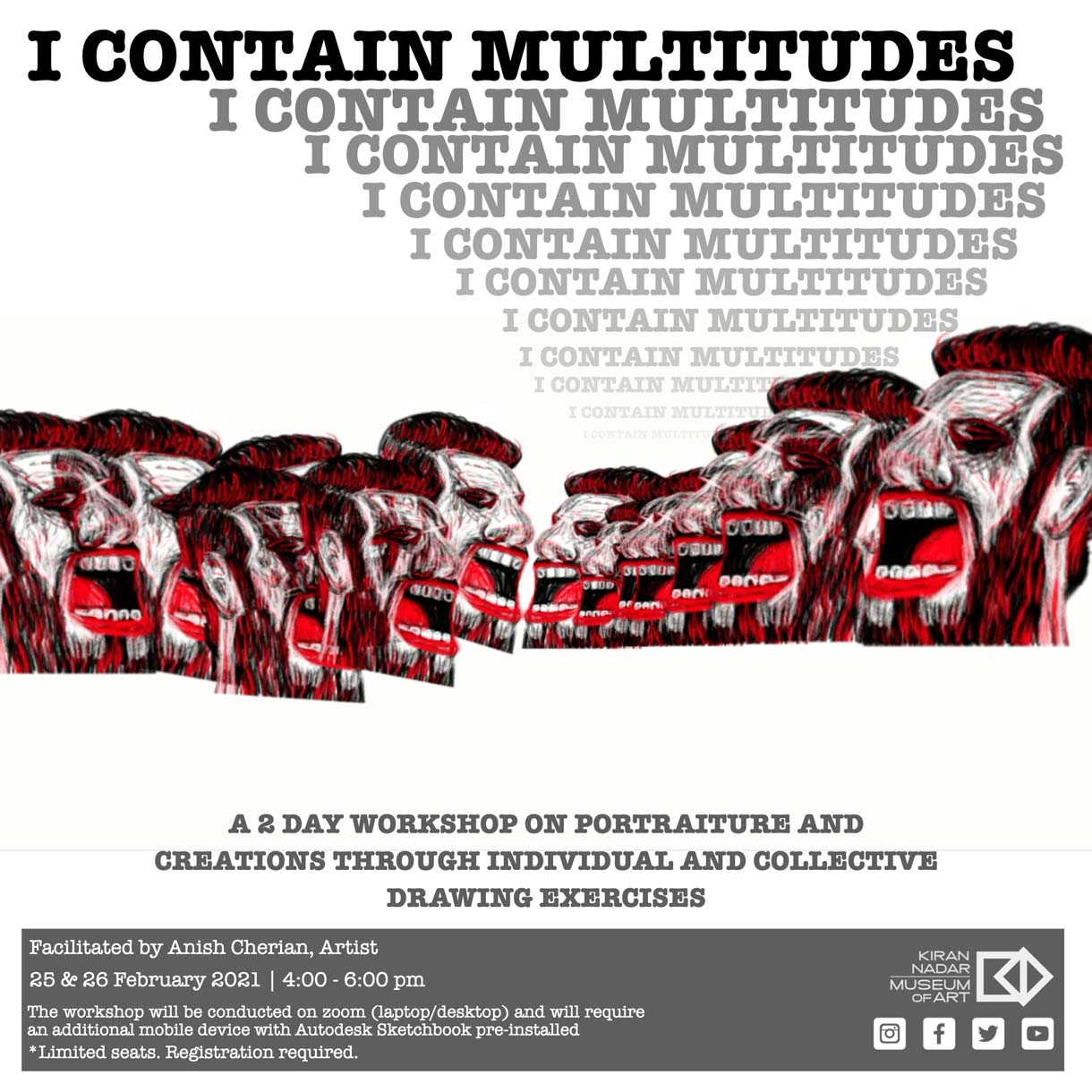
Kiran Nadar Museum of Art presents I CONTAIN MULTITUDES: A workshop on portraiture and creations facilitated by artist Anish Cherian. This two-day online workshop invites participants to reflect on portraits, characters, narrative, theme, and events in figurative drawings. Through individual and collective drawing exercises, using ideas and techniques in duplication, mark-making, and iconography, the workshop will explore the creation and reading signs or semiotic systems of meaning-making.
This workshop is suitable for those who have basic skills in drawing and are comfortable using digital drawing platforms. Participants will learn and work with Autodesk Sketchbook mobile application, and therefore are required to have a mobile device with the application pre-installed. Participants can also use other drawing surfaces and materials in addition. The sessions will be held on Zoom. Attending both days is mandatory. The workshop has limited seats.
Anish Cherian is a visual and performance artist based in Goa. He uses elements from architecture and modes of production to discuss systems of influence. Through these, he explores the visible and invisible performances of repetitive labor. His works can almost always be traced back to an archive, either personal or public. Yet, it is not the verifiability of the archive that he pursues. Going beyond archival abstractions his practice attempts to revitalize unrecordable memories and affects that are excluded from the archive and by extension the “official” narrative of our reality. He is a recipient of the Legislative Assistant for Member of Parliament Fellowship and resident at Skowhegan School of Painting & Sculpture. His drawings are currently part of an ongoing group show at KNMA titled, 'Right to Laziness...No, strike that! Sidewalking with the man saying sorry' curated by Akansha Rastogi.
Drawing Spaces
A 3-day workshop on creative mapping through drawing and collage
Facilitated by Sareena Khemka
04 – 06 February 2021
Registration for the workshop has been closed because we have reached the maximum number of registrations for the event. Thank you for your interest!

A space that one occupies, evokes a strong connection and leaves indelible impressions in one's mind. How do we make sense of these places visually with the attachments and emotions we associate with it? During the course of this pandemic we may have been confined to our homes, cities, alternate living spaces, spending time navigating it, that we have now developed muscle memories of that place. We know where each object is kept and have an associated emotion of each room we have occupied. We are able to visualize these spaces with our eyes closed. How do we interpret these places through drawing? Conversely we have yearnings of a place we wish to go to, walk on a particular street, go to our own house, a park, places within our city or our hometown itself. How do we draw the memory of these places and our imagination of them that may morph and adapt the images we have in our minds?
On a macro level if we think about the idea of mapping space, the strongest sentiments are evoked when one deals with issues of identity, where migration, loss, partition and the memories of home or the lack there of and or world events such as political and social changes feeds into the creative process. To channel all of that information, memory and emotion to make work that is poignant and visually provocative is a process of mapping spaces that we will delve into through this workshop by referencing works of artist Zarina Hashmi and her creative process.
Using drawing and collage through memory, maps and image, this 3-day workshop shall use various tools and techniques to distill images of places using imagined, remembered and real references in making an original map or a small series of them. All the sessions will be held on Zoom. Participation on all three days is mandatory.
Materials to be arranged by each participant:
A laptop with high speed internet, Scissors, ruler, old scrap magazine, pens, pencils – 2b, 4b, 6b pencils, charcoal pencil, black craft paper, paper cutter, fevicol, black drawing ink, old paint brush, eraser, A4 or A3 200-300 gsm drawing paper (loose or sketchbook format works), a writing notebook, small water container.
Participant eligibility
Basic skill and knowledge of drawing and using drawing material
Sareena Khemka is a visual artist working in mixed media drawing, painting and sculptural installations. Mapping cityscapes through narratives of its past and the future, her preoccupation with building a research-based practice on the subject has led her to work with several mediums that started with drawing and now includes sculpture and found object. Her current practice explores urban spaces through dichotomous ideas of construction and destruction, preservation and regeneration, man-made and organic environments, creating transformative spaces and objects that recall historical ruins and geological formations that have the potential for material evolution. Khemka holds a B.F.A degree in painting from The School of the Art Institute of Chicago and Kala Bhavan, Santiniketan. She has been a part of several group shows across India and has been a resident artist with Space 118, Mumbai and Piramal Art Foundation, Mumbai. She has conducted art workshops with the Art 1st Foundation, Mumbai, Mohile Parikh Center, Mumbai, Sangeet Shyamala, New Delhi amongst many others. The artist currently lives and works in Bangalore.
How to transmit earworms?
Exercises in Speculative Listening
Workshop with Suvani Suri
17, 19, 21, 23, 24 January 2021
THE ARTISTS’ WAY #4
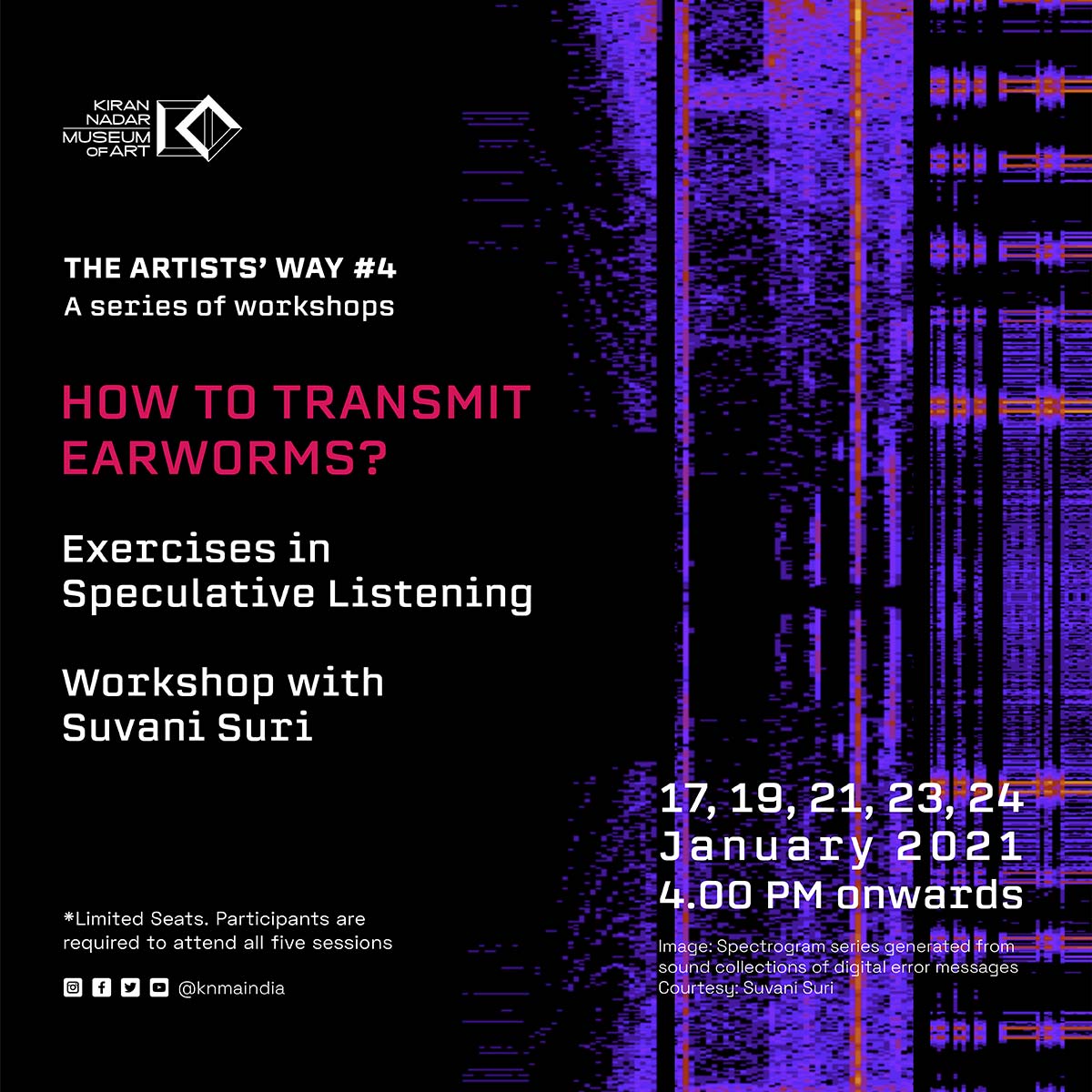
In the opening sections of More Brilliant Than The Sun: Adventures in Sonic Fiction (1998), Kodwo Eshun emphasizes that sound is a mode of thinking in itself and not merely that which is to be thought about.
Taking off from this concept and diving into the act of ‘fictioning’, the workshop explores possibilities of thinking through listening and transmitting earworms. A field of speculations and counter-speculations is seen to emerge from tuning in to the interstices of sound in existing narratives and apparatus – political, historical, technological and infrastructural. In the process of unearthing these, participants will be invited to a collective investigation into the philosophical and techno-political dimensions of voice, frequency and the audible. We start with a simple inquiry of ‘what does an earworm mean to you?’
The five sessions will delve into the practice of listening as a means of speculation, examining its many sensorial and generative possibilities. From leaning into the disquiet in science-fiction writings to the fictions that are always inhabiting the ‘real’ of the world, this intensive short-module will unpack and unsettle the field of the aural, and attempt to open the question of the ‘sensible’. Participants will collectively engage with the philosophical mediations on ‘listening’ by Jean Luc Nancy and the conceptual artefacts of Kodwo Eshun, while developing conversations around ideas of amplification, resonances, disquiet and acoustic dislocation or displacement across different mediums and technologies.
Intended as a participatory and discursive format, the workshop will follow an exercise-based methodology, along with a series of guest interventions that will catalyse our modes of sonic thinking and making. Participants will have access to a library of earworms specially populated for and during the sessions, viewing and listening materials, resources and readings.
This online workshop is free. Interested participants are expected to commit their presence on all days and undertake some group work between the sessions. The age limit for participation is 18 years and above. The workshop will explore the possibility of further collaborative work towards the end.
Suvani Suri is an artist and researcher based in New Delhi, India. Her interests and inter-media experiments have been tethered to the auditory spectrum, encountering and speculating its multi-fold possibilities. She has been exploring various modes of transmission such as podcasts, auditory texts, sonic environments, installations and live interventions. Alongside she has been actively involved in teaching at several universities and educational spaces.
This is the fourth program of the ‘The Artists’ Way’ series of experimental workshops, organized virtually by KNMA. These workshops are led by practicing artists who have been using workshops as part of their art making process, often collaborating with different groups and forming their own personal, formal and informal networks of learning and unlearning. The series is imagined as an exploratory platform, with part pedagogic intent and infused with new questions, doubts, playfulness and sometimes also involving a collective/collaborative production towards the end of the workshop. The program is part of KNMA Education Outreach, with the focus on artistic research as new pedagogies of the future. Each workshop is unique, different in format, scope and methodology, wherein artists also share their related research. ‘The Artists’ Way’ program is outlined by Akansha Rastogi, with Madhurima Chaudhuri, Neha Tickoo, Rajshree Poonam Gupta and Priya Chandra.

